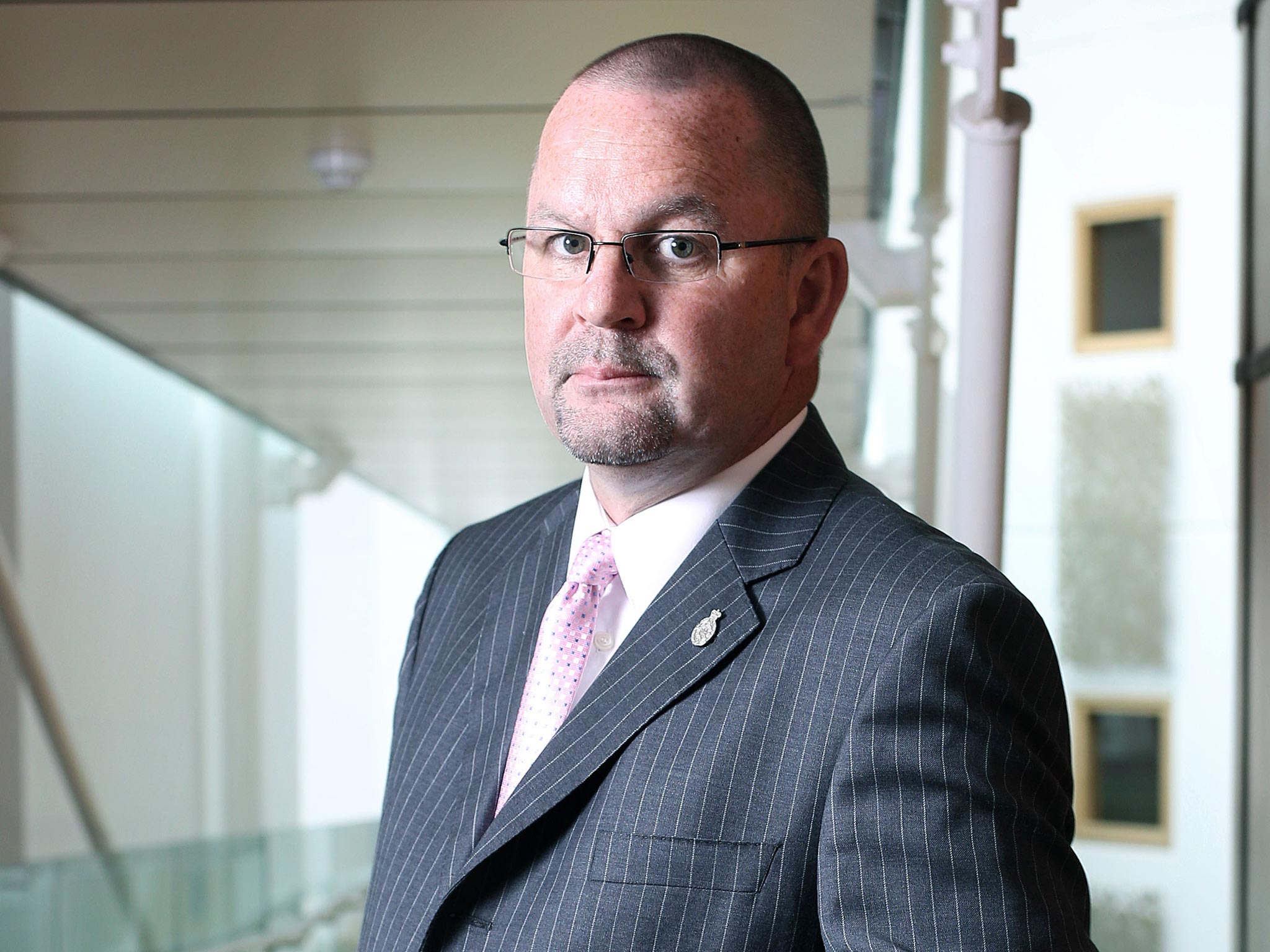Outgoing Police Federation chairman Steve Williams: 'I worked with hardened criminals, but nothing prepared me for the police'
The Police Federation chairman, who quit this week, tells Paul Peachey how the organisation has brought disgrace on itself

One of the country’s most powerful police leaders has revealed how political intrigue, personal attacks and sustained opposition to long-delayed reforms forced his premature departure from the once all-powerful body brought low by the Plebgate saga.
Steve Williams, a 30-year career detective, said that his work had brought him into confrontation with hardened criminals – but it had not prepared him for the hostility he experienced from colleagues within the Police Federation of England and Wales.
Mr Williams said that his unexpected decision to quit this week had finally provided the key moment in persuading battle-hardened “blockers” to agree changes to an organisation that had repeatedly gone toe-to-toe with the Government over budget cuts and changes to the service – and lost.
“I’m a seasoned cop, I’ve been around the block. I’ve dealt with an awful lot of people, bad people, in my time but it’s not how I would expect to be treated by colleagues,” the 53-year-old told The Independent in his first interview since he announced his resignation.
The two most senior figures and leading reformists of the organisation – that represents 127,000 rank-and-file police officers – said on Monday they were leaving after months of damaging attacks on the group, which had been damned for a “serious loss of influence” and incompetence in an independent report.
Mr Williams commissioned the review in the teeth of opposition from senior colleagues following a series of reversals over pay and condition negotiations, criticisms of lavish spending by senior figures and lack of influence over decision-makers. The battle continued this week after it emerged that rebellious branches had refused to tell the national leadership how much they had stashed in secret accounts.
His position had been precarious since he took charge. He said he had faced “hurdles, blockers and resistance” from within an organisation whose members had accused him of dictatorial and treacherous behaviour.
“I was constantly under this sort of pressure and people trying to do me down for what I was trying to bring about,” he said in an interview at the organisation’s £26m headquarters in Leatherhead, Surrey. “I’d been verbally, personally criticised publicly. I’ve been blanked, I’ve had emails, I’ve had texts. I’ve had some phone conversations. If I’m honest, it grinds you down. It was continual pressure.”
MPs published a previously unseen email this week written by Mr Williams in February in which he complained to senior colleagues that he felt he had been “gratuitously and cruelly bullied and humiliated”. The email followed an emotional and particularly bruising encounter with top officials over his plans but was never sent after a weekend’s reflection.
Mr Williams said he was disappointed that the email – shown to his former head of communications – had come to light as it raised questions about the pressures faced by his predecessor who died just before he was due to hand over the reins, aged 57.
“I was feeling very battered and bruised, I was feeling very emotional. I had had a tough time and a continual feeling of being under this immense pressure,” said Mr Williams of the email. “It was heartfelt at the time. I was just at a low point in my career. It was one of the worst days ever. It was a bad day and a bad weekend.”
Worn down by his bruising encounters and a weekly 550-mile round-trip to his family home in north Wales, where his wife and three young children live, he decided to quit last weekend. “I woke up on Saturday morning, bolt upright. I woke my wife up and said, ‘I’ve come to my decision: I’m going to retire from policing.’”
Mr Williams took over the organisation in December 2012, two months after the former Tory Chief Whip Andrew Mitchell resigned following a ferocious campaign by sections of the federation, which had accused the MP of swearing at a Downing Street officer and calling him a “pleb”.
The scalp of Mr Mitchell – who had denied using the toxic phrase – was seen as payback after government changes to the service and the appointment of Tom Winsor as Chief Inspector of Police after he had championed the changes. It subsequently emerged that a witness to the row was a Metropolitan Police officer who had lied about what he had seen. The officer, PC Keith Wallis, was jailed for a year in February.
Despite internal resistance, Mr Williams commissioned a review headed by Sir David Normington, a former Home Office permanent secretary, as his first act on taking over.
It called for greater control on branch officials, financial transparency and a number of other measures, reigniting simmering battles within the federation.
Sir David said this week that the departure of Mr Williams and the general secretary Ian Rennie marked a “dangerous moment” for the organisation in which blockers of reform could take hold of the organisation again.
But Mr Williams said yesterday that he was confident that with his resignation the battle for reform had been won and that his colleagues would back it at their annual conference in May.
“I think it [the resignation] has helped push the reforms a little bit further along – ‘Look, gosh, Steve Williams is going’ – and that attitude has perhaps helped to make the change. It’s time for me to hang up my helmet and move on and let someone else see through the inevitable changes.”